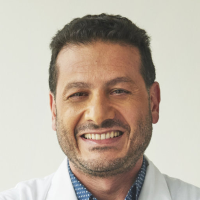5th International Conference on
Gynecology and Obstetrics
August 13-14, 2026 | Barcelona, Spain

Gynecology 2026

Ben Gurion University, Israel
Abstract:
Introduction:A niche is an isthmical defect, most often caused by a caesarean section. It has
been associated with poorer implantation; Suggested mechanisms include secretions’
accumulation, a mechanical disruption or a chronic inflammation. Our aim was to
identify and compare the immune cell population among patients with and without a niche. Methods:The study
was conducted at the Hadassah Mt. Scopus sono-hysterosalpingogram clinic, utilizing
mid follicular phase uterine lavage from patients with a niche (cases) compared
to intact cavity (controls). The wash samples were processed, supernatant
discarded and RBCs removed. Cells were then washed with FACS buffer ,subjected
to antibody staining and examined by flow cytometry. Antibodies utilized
included: CD45,UV,CD3,CD19,CD66B,CD88, CD89, CD14,CD16,CD314,HLA-DR in order to
identify monocytes, dendritic cells, T cells, B cells, NK and Neutrophil
populations. Results 16 patients
were included: 6 cases and 10 controls. Generally, all samples included 1ml
volume and the total number of cells counted was similar between cases and
controls (P=0.6). NK cell median value was significantly lower among niche
patients (P=0.007). No specific cell line demonstrated a consistent dominance pattern and no other statistical differences were
tracked between cell populations in cases and controls (P > 0.5 for
monocytes, dendritic cells, T cells, B cells and Neutrophils). Conclusion
We
report a novel technique for analyzing uterine cavity immune cell composition through
a uterine lavage. In our small sample a wide biological immune span was demonstrated,
with a possibly differential distribution of NK cells in the niche environment.
Biography:
Dr. Yaakov Bentov earned his Medical Degree at Ben Gurion University in Israel. As a medical student, he founded a bachelor’s program in Emergency Medicine for paramedics, and later served as its Program Head. He had also pursued a master's degree in Medical Business Administration (MBA) while completing his residency in Obstetrics Gynecology (1995-2002). Both programs were at Ben Gurion University. After completing his residency, he came to Toronto to complete a fellowship in Reproductive Endocrinology and Infertility (REI) at the University of Toronto. He later took the roles of medical director of the Ontario based Juno Fertility clinics as well as an associate REI & a research director at ANOVA fertility.
Dr. Bentov is an currently a senior REI in the Department of Obstetrics and Gynecology at Hadassah Mt. Scopus in Jerusalem. He pursues research in the areas of ovarian function and pathology, infertility, and reproductive endocrinology as well as an inventor of medical devices. Dr. Bentov has published research in more than 80 peer reviewed research publications as well a book and several other book chapters. He is an editor for several leading medical journals.
